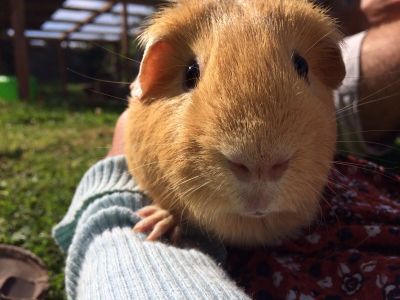
Posted By:
Guinea pigs are a popular but underrated pet in the UK and in veterinary practice only a small proportion are seen regularly compared to our cats and dogs. They can be a really interesting pet to own and are often fascinating to watch, either feasting on food or interacting with their companions, but it is important to be up to speed on their health and husbandry too.
Originally from South America, they were brought to Europe by the Dutch and are now bred in lots of different colours, styles, coats and some are even hairless! With the right care and attention, we can expect our guinea pigs to live towards 5 and 6 years old, and a lot depends on the right diet. Guinea pigs are happiest when they are eating, and when housed outside they seem to be almost constantly grazing the grass away. They usually consume 6% of their body weight a day, and with the average weight of a guinea pig being approximately 1kg, this can equate to 60 grams of food.
However owners have to be responsible in what proportion they are making up their guinea pigs’ diet, as a common problem within the species is obesity. Too much of their pellets is likely to contribute to an overweight guinea pig, and owners commonly overfill the bowl! A complete pellet feed (rather than muesli mix) is best, and the guidelines should always be followed, but a good sized daily amount is roughly a spoonful. A handful of green vegetables like kale and broccoli are advised, with herbage hay and grass making up the remainder of their meal times.
The fibre that the hay and pellets contain is crucial to their gut remaining healthy and to ensuring the teeth remain worn down – they grow continuously, unlike in humans! Not enough fibre could result in diarrhoea and overgrown teeth which can then result in pain and a lack of appetite. The greens and pellets also contain vitamin C, which is especially important to the guinea pig species, particularly for their immune system which will keep them alert and healthy.
Guinea pigs are very social animals, and need to be kept with companions – other guinea pigs. They will be very stressed and unhappy if kept alone and so must come with a friendly partner. Companions can be same or mixed-sex – same sex pairs don't tend to fight if brought up together, but may clash if introduced later in life. Mixed pairs usually get on fine but can quickly become ‘over friendly’! At just three months of age, mating can occur so to prevent the possible problems of unwanted babies or hormone related fighting, neutering of males (castration) is advised and it is therefore very important to be able to tell males apart from females – this can be tricky but may be demonstrated at the vets if unsure!
If a female is pregnant, her first litter should at least be before she is a year of age, as any later and their hips can fuse in a position that won’t allow the passing of a baby piglet through the birth canal. Remarkably and unusually for their small size, they have a relatively long gestation period of 63 days, meaning they are pregnant for 9 weeks – the same as a cat or dog. This is because guinea pig babies are precocious – which means they are born ‘ready to go’ with a full coat, teeth present, eyes open and as a good size; they even usually start nibbling on solid food on their second day in the world!
Although they may not be many people’s first idea of a rewarding and entertaining pet, guinea pigs can actually be a lot of fun to own – but with any species owners need to do their research to make sure they are kept healthy and happy so that we can all enjoy them for as long as possible!
Whilst on my visits I have been having several discussions...
As our feline friends get older there are a few conditions...
Another winter discussion group season is now behind...
©2024 Shepton Veterinary Group Ltd., All rights reserved.
Privacy Policy • Terms & Conditions • Cookie Policy